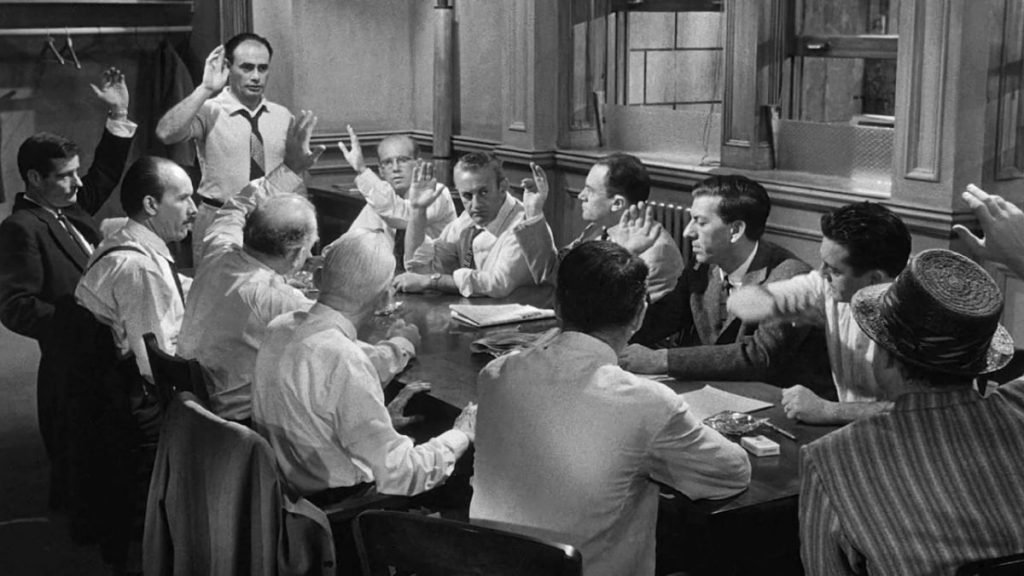
That’s us! We’re referred to as “stiff-necked” (stubborn as an ox) at least 18 times in scripture. Anyone with a family KNOWS it’s true. The worst offenders can be those closest to us. God Himself—although He loves His children—can barely stand us sometimes, as he told Moses a couple of those times in the chapter preceding this Sunday’s first reading (EX 33:2-5):.
I will send an angel before you to a land flowing with milk and honey. But I myself will not go up in your company, because you are a stiff-necked people; otherwise I might consume you on the way. … The LORD spoke to Moses: Speak to the Israelites: You are a stiff-necked people. Were I to go up in your company even for a moment, I would destroy you.
With that loving threat in mind, I’m invoking the memory of Henry Fonda’s Juror Number 8 from the great stage play and movie “12 Angry Men” here. In a key scene, he’s trying to convince his fellow jurors to consider the innocence of a kid charged with murder. That’s despite the testimony of a witness who heard the kid tell the victim “I’m going to kill you!” Could that witness have misinterpreted the intent of the accused?
Juror #8 : “Supposing [the witness] really did hear it. This phrase, how many times have all of us used it? Probably thousands. ‘I could kill you for that, darling.’ ‘Junior, you do that once more and I’m gonna kill you.’ ‘Get in there, Rocky, and kill him!’… See, we say it every day. That doesn’t mean we’re gonna kill anyone.”
And indeed, the next chapter of Exodus, from which Sunday’s first reading comes (EX 34:4b-6, 8-9), shows us a Father who is softened by his child’s begging for acquittal:
Moses at once bowed down to the ground in worship. Then he said, “If I find favor with you, O Lord, do come along in our company. This is indeed a stiff-necked people; yet pardon our wickedness and sins, and receive us as your own.”
Of course, we know God forgives his people. But can we forgive ourselves? As that angry jury of 12 proved, the time they spend judging the accused reveals many prejudices among them, stiffening their necks against looking at the situation from any other perspective but their own. The passion inside this claustrophobic jury room stirs up one particularly prejudiced juror to threaten Fonda’s Juror #8 for making such a convincing case to acquit:
Juror #3 : What’s the matter with you guys? You all know he’s guilty! He’s got to burn! You’re letting him slip through our fingers!
Juror #8 : [brow furrowing] “Slip through our fingers”? Are you his executioner?
Juror #3 : I’m one of ’em!
Juror #8 : …Perhaps you’d like to pull the switch?
Juror #3 : For this kid? You bet I would!
Juror #8 : I feel sorry for you. What it must feel like to want to pull the switch! Ever since you walked into this room, you’ve been acting like a self-appointed public avenger. You want to see this boy die because you personally want it, not because of the facts! You’re a sadist!
[#3 lunges wildly at #8, who holds his ground. Several jurors hold #3 back]
Juror #3 : I’ll kill him! I’ll – kill him!
Juror #8 : You don’t really mean you’ll kill me, do you?
Gotcha! Guilty of stiff-neckery, as charged—and hypocrisy to boot. But Juror #3 isn’t beyond redemption. It is revealed that this poor man is estranged from a son similar in age to the accused boy they’re judging. And now that the situation has shifted from 11 to 1 guilty to 11 to 1 not-guilty, the new lone standout shuffles through his personal papers saying he “has all the facts here,” and falling to the table is a photograph of his son and him in happier days. He collapses in tears and sobs “not guilty.” One by one the jurors leave the room but Juror #8 stays behind and helps #3 put his coat on, in a gesture of peace.
This brings us to Sunday’s second reading (2 Cor 13:11-13) in which Paul advises the Corinthians to do likewise.
Mend your ways, encourage one another, agree with one another, live in peace, and the God of love and peace will be with you.
So, in our movie’s final scene (click the link to view), the 12 Angry Men find the accused boy not guilty. But in the process, the source of each juror’s anger is revealed. In the case of Juror #3, the anger is over a child he loves but can’t stand. That anger has condemned this stiff-necked man to a life of living without his son’s love. As Sunday’s gospel reading from John concludes (Jn 3:16-18), condemnation to a hell without God’s love is always self-imposed.
Whoever believes in him will not be condemned, but whoever does not believe has already been condemned, because he has not believed in the name of the only Son of God.
The Solemnity of the most Holy Trinity reveals God’s full name: Father, Son and Spirit. That last name binds humanity to the first two. That family bond is ours to keep or break.
–Tom Andel